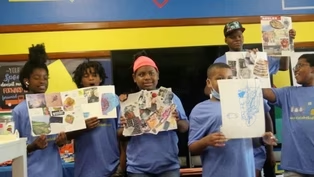
National Suicide Prevention Month with NAMI Michigan
Clip: Season 52 Episode 38 | 7m 27sVideo has Closed Captions
Suicide Prevention Month spotlights efforts to combat mental illness in Black community.
September is National Suicide Prevention Month, and one in five Americans are affected by mental health conditions according to the National Alliance on Mental Illness (NAMI). Host Stephen Henderson talks with NAMI Michigan Executive Director Kevin Fischer, who lost his son to suicide, about his organization’s efforts to combat stigma around mental illness and suicide.
Problems playing video? | Closed Captioning Feedback
Problems playing video? | Closed Captioning Feedback
American Black Journal is a local public television program presented by Detroit PBS

National Suicide Prevention Month with NAMI Michigan
Clip: Season 52 Episode 38 | 7m 27sVideo has Closed Captions
September is National Suicide Prevention Month, and one in five Americans are affected by mental health conditions according to the National Alliance on Mental Illness (NAMI). Host Stephen Henderson talks with NAMI Michigan Executive Director Kevin Fischer, who lost his son to suicide, about his organization’s efforts to combat stigma around mental illness and suicide.
Problems playing video? | Closed Captioning Feedback
How to Watch American Black Journal
American Black Journal is available to stream on pbs.org and the free PBS App, available on iPhone, Apple TV, Android TV, Android smartphones, Amazon Fire TV, Amazon Fire Tablet, Roku, Samsung Smart TV, and Vizio.
Providing Support for PBS.org
Learn Moreabout PBS online sponsorshipSeptember is National Suicide Prevention Month, and that is a time to raise awareness about mental health conditions, shift public perception, and share vital resources that can help prevent suicide.
My first guest is the executive director of the Michigan branch of the National Alliance on Mental Illness.
I spoke with Kevin Fischer about his efforts to improve the lives of individuals and families that are affected by mental illness.
So September is a National Suicide Prevention Month.
I feel like in our community, in the Black community in particular, this takes on a different kind of dynamic, perhaps, than it does in others.
There's a real sense of shame, I think, that gets associated with mental illness and help for mental illness, and that drives a lot of what people are dealing with underground.
That happens even more astutely, I think, when we're talking about our young people.
- Absolutely.
I always tell people, mental illness doesn't discriminate.
Neither does stigma, but stigma varies by community and culture and the stigma associated with mental illness and suicide prevention in the African American community is very unique and it is very powerful and we need to address it.
- Yeah, yeah.
So talk about some of the things that happen during Suicide Prevention Month that you think help move the needle here.
- Well, one of the first things we need to do is increase awareness.
NAMI, for example, during the month of September, we host what we call NAMI Walks events, which are very much like Breast Cancer Awareness.
We just had one at the University of Michigan last weekend.
We'll be hosting one at the University of Detroit Mercy on September 21st and we'll have one in Grand Rapids on Davenport University's campus on September 28th.
And while there are fundraising events for our local affiliates, most importantly, they are awareness-raising events and they're also behavioral healthcare fairs.
So for example, in Detroit, we will have over 20 behavioral healthcare provider organizations there that are there with lots of information, help the community understand what resources are available and how to access those resources.
And equally as important, let's shed the stigma and the shame associated with mental illness, so we can encourage people who need help to seek that help and then make it as easy as we possibly can to connect them with those resources so they can utilize 'em.
- Yeah, yeah And I mean this is an issue where the success of intervention is unquestioned, right?
When somebody gets help, when somebody intervenes with someone who's having a problem, we're able to prevent the worst from happening.
But it is about that intervention and it's about the awareness and the acknowledgement that someone needs help.
- It truly is.
If we can remove the stigma associated with mental illness and encourage people to seek the help that they need, that's the battle.
With regard to suicide, one of the most frustrating myths is that a person who decides to end their life, once they make that decision, there's nothing you can do.
Nothing could be further from the truth.
In 90% of cases, people who have survived suicide attempts have told us, "I didn't want to die.
I was trying to end an emotional pain."
And most said, "I just needed somebody to talk to."
And so not everybody needs a psychiatrist or psychologist, though if that's what you need, don't be afraid to do that.
But most people, especially specifically related to suicide, just need to be heard.
They find themselves in temporary situations.
They don't think there's a way out.
They're afraid to raise their hand and say, "I need help," again, especially in our community, because we don't want to appear weak, we don't want to appear needy.
And we need to understand that mental illness is a medical diagnosis.
It's not a choice, it's not a weakness of character or faith, and having suicidal thoughts is common.
Acting on those thoughts is not, and that there is help available.
- Yeah, yeah.
So you lost your son to suicide 14 years ago I believe.
- Correct.
- I wanna give you a chance to talk about that, the healing process that you've gone through, and things that you would say to other parents and other people who are dealing with this issue.
- Yeah, so 14 years ago, June 27th, 2010, we lost my oldest son, Dominique, to suicide at age 23.
He had been diagnosed with bipolar disorder and schizophrenia about three years prior, and we were totally ignorant to behavioral healthcare and all of that.
The healing journey for me has been one that's very interesting because after losing Dominique, and this is very common, you're 10 times more likely to experience suicidal ideation yourself after losing someone to suicide.
So I went through that.
I came very close to taking my own life.
I am very grateful and blessed that I did not go through with that.
I have a therapist, I belong to support groups, but my work at NAMI is truly my real therapy.
Being a resource to others that Dominique and I didn't have is really helpful for me.
And so I always say I don't like the way I got here, but I'm glad I'm here and I'm glad I'm able to help others who aren't aware of the resources that are available, as Dominique and I were.
- Yeah.
Do you see progress over time, in terms of getting people to be more aware, be less affected by stigma, and I guess more motivated to deal with intervention and things like that?
- So awareness is increasing.
Unfortunately, stigma is also increasing.
So that's really tough.
I just saw the most recent death by suicide numbers and we experienced a slight decline.
In 2022, we lost 69 less people, nationally, to suicide than we did the previous year, but keep in mind, those are staggering numbers.
Our death by suicide rate in the United States is at an all time high.
- Yeah.
- Almost 50,000 people were lost to suicide.
That's twice as many people than we lose to homicide each year.
So the numbers are really scary.
Stigma, to me, is still the leading culprit.
And it's the most cost effective way, if we can normalize the conversation about mental illness, encourage people to get help, we can improve the quality of and save lives.
Caleb’s Kids supports young people’s mental health
Video has Closed Captions
Clip: S52 Ep38 | 4m 9s | A local Detroit organization Caleb’s Kids supports students struggling with mental health. (4m 9s)
Detroit Black Film Fest couples with Taste of Black Spirits
Video has Closed Captions
Clip: S52 Ep38 | 12m 33s | Detroit Black Film Festival couples with Taste of Black Spirits National Conference. (12m 33s)
Providing Support for PBS.org
Learn Moreabout PBS online sponsorship
- News and Public Affairs

Top journalists deliver compelling original analysis of the hour's headlines.

- News and Public Affairs

FRONTLINE is investigative journalism that questions, explains and changes our world.












Support for PBS provided by:
American Black Journal is a local public television program presented by Detroit PBS

